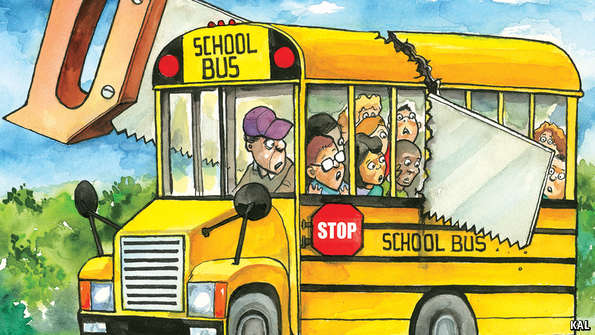
I spent quite a bit of time this summer explaining to friends a switch I made, from teaching history to teaching economics. People who grew up with me, or who knew me in college, have a bit of a hard time with that switch, given the kind of history lover that I am. Therefore, I often find myself explaining what makes teaching economics compelling. Those conversations gave shape to the lesson I did today. During a shortened block, I spent a great deal of time tasking students with explaining this riddle:
If seat belts are so safe, and if we regularly buckle up when driving or riding, why don't we equip school buses with seat belts?
Though the riddle might seem silly, I offered it as a good metaphor for much of the thinking we'll do in AP Macroeconomics this year. If one can understand how adding seat belts might actually make buses less safe, or make them marginally safer but lead to an increase in behaviors that are unsafe, it's really just a logical jump to, say, the "crowding out effect" or the counter-intuitive logic behind why a strong dollar actually hurts U.S. consumers. The riddle worked in prompting the students to think economically.
By the way, you can read what the National Traffic Highway and Safety Administration has to say on the topic here or here.
The discussion, and a recent Economist article, prompt a more thoughtful consideration of some choices we're faced with today in public education. Running buses can be an expensive proposition. Though it's a safer, more cost-effective, and more environmentally-friendly means of getting a population to school, that transportation represents a significant cost to school and, therefore, to taxpayers. Consequentially, school districts around the country are cutting the service, often by expanding the radius outside of which one must live to qualify for bus service.
As schools look to save pennies, nickels, and dimes on bus transportation they risk undermining the mission of a public school and undoing something American schools have done right. We were one of the world's first democratic republics to consecrate public schooling as a mission of the state. We worked throughout the twentieth century to expand that mission, making the school year last longer, normalizing the completion of high school, providing lunches (and then breakfasts) to students, and, of course, seeing to it that transportation to/from school would be in the schools' rather than the parents' hands. These expansions of the missions come back to one central premise of American public education: all are welcome and deserving of it.
We now look at ways to lower the price tag of this mission, which means curtailing the mission. And that means looking at ways that we risk reversing strengths that made our system stand out from those of our peer nations.
There's more to this school bus riddle than what meets the eye, which is why it's one of the better riddles I have begun a year with in Macroeconomics.





